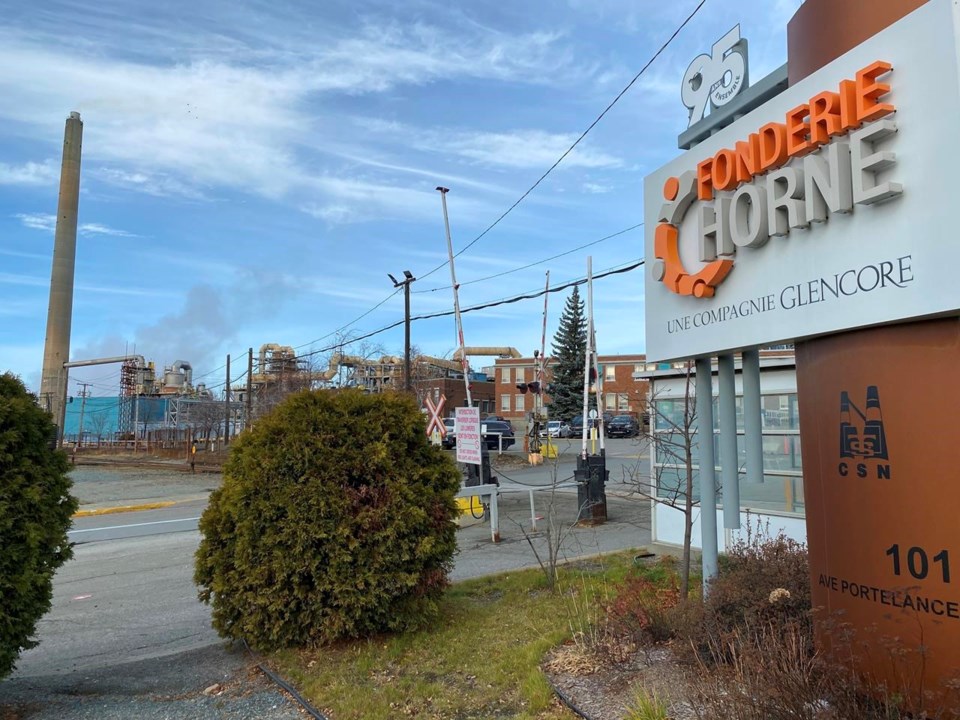ROUYN-NORANDA, Que. — An announcement this week that some 200 families would be relocated from a Rouyn-Noranda neighbourhood contaminated by smelter pollution was met with anxiety and concern for those who will be moved out.
While some residents of the Notre-Dame neighbourhood, in the city about 630 kilometres north of Montreal, see it as a chance to leave a sector where arsenic emissions from the Horne copper smelter are associated to a higher risk of cancer, others greet the impending move with sadness and anguish.
Ginette Bédard has felt the full range of emotions in recent days.
Since learning this week she will have to move from the neighbourhood she's called home for 30 years, she progressed from anxiety to tears to fear.
"This doesn't work for me at all, where am I going to go? At my age? Retired?" said Bédard, a former orderly.
The Quebec government announced Thursday it would provide $88.3 million to support the City of Rouyn-Noranda to create a neighbourhood, while Glencore, the company that owns the smelter, will buy the properties and land from willing sellers in the contaminated area.
The company will also be required to reduce its emissions to meet a target of 15 nanograms per cubic metre by 2027, down from a level of 100 nanograms per cubic metre that was permitted under a 2017 agreement with the province.
During a visit to the neighbourhood, The Canadian Press noted the snow was sprinkled with black particles in several places. The regional health board in the Abitibi-Témiscamingue said an analysis is underway and Glencore said the particles are dust from copper concentrate.
Notwithstanding health risks related to arsenic, and despite the smell and noise from the factory, Bédard likes the neighbourhood where her grandchildren also reside.
"I was fine here. It's quiet. I'm happy, I have my routines," Bédard said. "Now (with the move), I'm totally in the dark. I'm discouraged. I'm very sad."
Her monthly rent is $550 and Bédard says there's no way she'll be able to find another apartment at that price.
"There are people who are worse off than me in the neighbourhood, poor people who are in tough. What will they do?" she asked.
Residents such as Audrey-Anne Dostie, who lives next door to Bédard, see relocation as a chance to escape a place they feel is dangerous for their health.
"I've thought several times of leaving," Dostie said, noting she wants to have children one day — "but not here."
One of the reasons she and her partner haven't left is high rent elsewhere and a shortage of apartments.
Meanwhile, property owners will have to negotiate with Glencore, which will purchase properties and demolish them. How the company will determine the value is being worked out, a company spokeswoman said.
Marie-Ève Duclos, owner of a four-unit building, is a bit fearful of the process of selling her property.
"To what point will I, as a citizen, be properly equipped once seated across from a multinational like Glencore to negotiate something?" Duclos asked. She is also concerned about the fate of her tenants.
"I have tenants who don't have a car, they can't be relocated outside the city," Duclos said. "Here they are near all the services, the hospital, the schools, the pharmacy — it's their neighbourhood, their ties are here. That worries me."
On Thursday, Quebec's Municipal Affairs Minister Andrée Laforest reassured the 200 families they would be able to stay in their homes until a new residence was ready. Of the money being allocated to the City of Rouyn-Noranda, $58 million is for new housing, but there's no timetable for completion. There will also be support for those who see their rents go up.
For her part, Bédard is skeptical of politicians' assurances and wonders if their actions will back up their words.
Rouyn-Noranda Mayor Diane Dallaire said she's aware there's a delicate task that awaits them and assured residents impacted will be kept in the loop throughout the process.
This report by The Canadian Press was first published March 18, 2023.
Stéphane Blais, The Canadian Press



